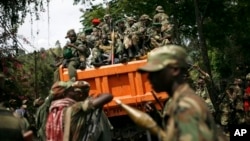STATE DEPARTMENT —
The Obama administration wants Rwanda to stop backing Congolese rebels who are undermining efforts to end decades of violence in East Africa's Great Lakes region.
State Department spokeswoman Jen Psaki on Tuesday said the country needs to cut off the Democratic Republic of Congo's M23 rebellion, whose fighting with government troops has driven a new wave of refugees into border towns.
The announcement comes two days before Secretary of State John Kerry is scheduled to chair a special session of the U.N. Security Council on the Great Lakes regional conflict.
"We call upon Rwanda to immediately end any support to the M23, withdraw military personnel from eastern DRC, and follow through on its commitments under the framework," she said, referring to a regional framework for ending the crisis that has been weakened by Rwanda's support for the rebels.
"M23's renewed fighting seriously undermines regional and international efforts to peacefully resolve the situation in eastern DRC."
Psaki also cited a Human Rights Watch investigation saying Rwanda has provided ammunition, food and training to the rebels while allowing M23 leaders to recruit inside Rwanda, including among demobilized Rwandan soldiers.
Psaki called findings of the report by the New York-based rights group, which were published Monday, "a very powerful case."
The United States has largely avoided publicly accusing Rwanda of backing M23 rebels, despite allegations by the United Nations and European allies. Washington did suspend military assistance to Kigali following a U.N. report last June that linked Rwandan defense officials to the group.
Tuesday's statement represents Washington’s first response to recent M23 clashes with the Congolese military near Goma, and that it did not directly implicate Rwandan President Paul Kagame, a U.S. ally.
Then-Secretary of State Hillary Rodham Clinton joined in a U.N. meeting on M23 at last year's General Assembly that diplomats have since described as highly critical of Rwanda's involvement.
In a written statement following that session, Rwanda's government denied the allegations, saying that resolving the crisis in Congo would be impossible "if the international community continues to define the issue erroneously."
The statement quoted Kagame as finding "perplexing" the degree to which the international community focuses on M23 at the expense of "much broader challenges." It warned that "singling out one group out of many is running away from the actual issue."
State Department spokeswoman Jen Psaki on Tuesday said the country needs to cut off the Democratic Republic of Congo's M23 rebellion, whose fighting with government troops has driven a new wave of refugees into border towns.
The announcement comes two days before Secretary of State John Kerry is scheduled to chair a special session of the U.N. Security Council on the Great Lakes regional conflict.
"We call upon Rwanda to immediately end any support to the M23, withdraw military personnel from eastern DRC, and follow through on its commitments under the framework," she said, referring to a regional framework for ending the crisis that has been weakened by Rwanda's support for the rebels.
"M23's renewed fighting seriously undermines regional and international efforts to peacefully resolve the situation in eastern DRC."
Psaki also cited a Human Rights Watch investigation saying Rwanda has provided ammunition, food and training to the rebels while allowing M23 leaders to recruit inside Rwanda, including among demobilized Rwandan soldiers.
Psaki called findings of the report by the New York-based rights group, which were published Monday, "a very powerful case."
The United States has largely avoided publicly accusing Rwanda of backing M23 rebels, despite allegations by the United Nations and European allies. Washington did suspend military assistance to Kigali following a U.N. report last June that linked Rwandan defense officials to the group.
Tuesday's statement represents Washington’s first response to recent M23 clashes with the Congolese military near Goma, and that it did not directly implicate Rwandan President Paul Kagame, a U.S. ally.
Then-Secretary of State Hillary Rodham Clinton joined in a U.N. meeting on M23 at last year's General Assembly that diplomats have since described as highly critical of Rwanda's involvement.
In a written statement following that session, Rwanda's government denied the allegations, saying that resolving the crisis in Congo would be impossible "if the international community continues to define the issue erroneously."
The statement quoted Kagame as finding "perplexing" the degree to which the international community focuses on M23 at the expense of "much broader challenges." It warned that "singling out one group out of many is running away from the actual issue."
